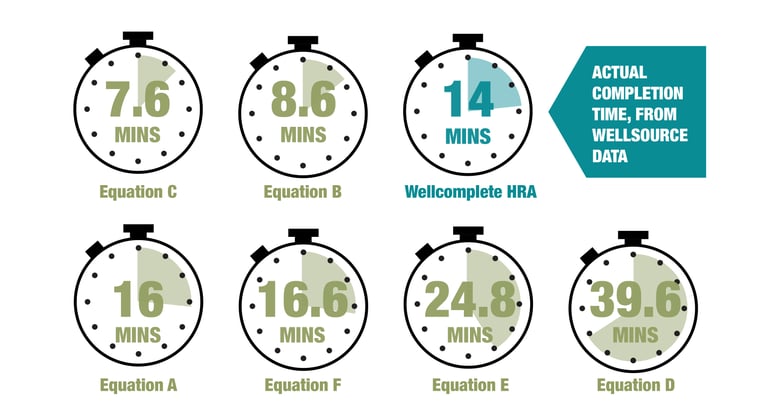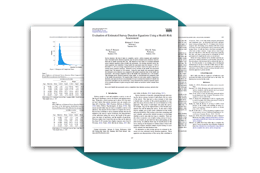When you’re in the business of asking questions—and getting people to answer those questions—you’re always looking for better ways to engage people. For health risk assessments, balancing user engagement and collecting all the data you need for a complete picture of a person’s well-being can be difficult, to say the least. That’s why we at Wellsource dedicate our time and resources to finding the best possible way to administer easy-to-complete assessments that gather reliable, actionable data.
Survey duration—the time it takes to complete a survey—affects response and completion rates. Estimated survey duration equations may be used to calculate how long a survey or assessment might take, but there are no studies assessing their accuracy.
The Wellsource team recognized an opportunity to evaluate survey duration equations, using the vast set of health risk assessment (HRA) data available to us through our health risk assessment products. Their findings were recently published in an article titled “Evaluation of Estimated Survey Duration Equations Using a Health Risk Assessment” in the August 2021 edition of Survey Research Methods.
Highlights
- Six existing survey duration equations were evaluated.
These equations vary in their approach, using any combination of word count, number of questions, number of open text boxes, types of questions, etc. to calculate duration. - Over 80,000 completed HRAs were used to evaluate the equations.
The evaluation was based on 81,876 individuals who completed the Wellcomplete Health Risk Assessment for the Workforce during the 2018 calendar year. Each assessment has an associated completion time. - Defining the average respondent—and average survey experience.
Since the Wellcomplete Health Risk Assessment for the Workforce uses branching logic, the length of the survey and the number of questions asked would vary from user to user. So the Wellsource team worked to build an average respondent profile, using data from health assessments and used this profile to evaluate the six equations.
Click here to view an executive summary of this study, including our approach and detailed results.
Findings
All six of the evaluated survey duration equations either over- or underestimated the completion time from the Wellcomplete HRA. Depending on the equation, it was estimated the assessment would take anywhere from 7.6 minutes to 39.6 minutes to complete. The actual average completion time from the Wellsource dataset was 14 minutes.

Using estimated survey duration equations can be a helpful way to evaluate how long it would take a person to complete a survey, especially in the early phases of development before refining the final survey. But it’s important to know what equation will be the most accurate—and to use the equation to create the shortest possible survey that still collects the data you need.
Future research on estimated survey duration equations is needed, and the Wellsource team looks forward to continuing this work.
Our Commitment to Continued Excellence in Assessment Design
Research like this is an important part of the work Wellsource does to ensure our products represent evidence-based algorithms grounded in solid science. All Wellsource products are based on sound scientific research published in peer-reviewed literature, as well as recommendations made by leading health and medical organizations.
This particular study was conducted by a coordinated effort across Wellsource departments: health and research, client success, and product development. The collaboration of this team is emblematic of our company’s mission: to build the tools that empower people to enjoy the longest, most satisfying, and productive quality of life possible.
Evaluation of Estimated Survey Duration Equations Using a Health Risk Assessment
Brittany Carter, James Bennett, Elric Sims
Survey Research Methods
Volume 15, Number 2, Pages 187-194
https://ojs.ub.uni-konstanz.de/srm/article/view/7800









